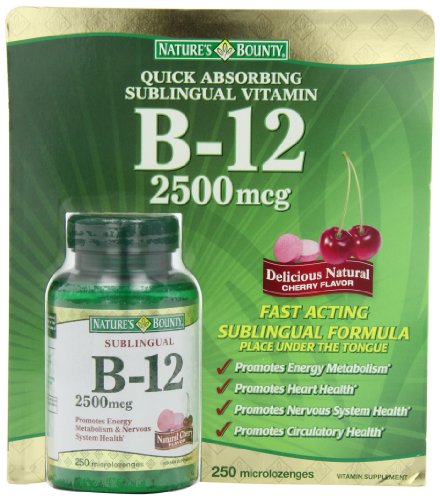Vitamin B12, also known as cobalamin, is an essential nutrient that is a member of the B-complex vitamins. B12 is the largest and most structurally complex of all known vitamins. There are several forms of vitamin B12, all of which are termed “cobalamins” because they contain the trace mineral cobalt in their nucleus structure. Some forms of B12 are not immediately bioavailable and your body must use enzymes to convert them to a usable form. However, methylcobalamin and hydroxocobalamin (5-deoxyadenosylcobalamin) forms are highly bioavailable.
Where Can You Get Vitamin B12?
 Jarrow Formulas Methyl...
Buy New $12.42
(as of 10:37 UTC - Details)
Your body doesn’t make vitamin B12, you need to get it through your diet or by supplementation. It’s found mostly in foods of animal origin such as meat, fish, and eggs. Even though only bacteria and archaea can synthesize B12, animals integrate B12 into their tissues via bacterial symbiosis, which is why animal foods are naturally the richest source of B12. Fortified foods and supplements are also common sources of the nutrient.
Jarrow Formulas Methyl...
Buy New $12.42
(as of 10:37 UTC - Details)
Your body doesn’t make vitamin B12, you need to get it through your diet or by supplementation. It’s found mostly in foods of animal origin such as meat, fish, and eggs. Even though only bacteria and archaea can synthesize B12, animals integrate B12 into their tissues via bacterial symbiosis, which is why animal foods are naturally the richest source of B12. Fortified foods and supplements are also common sources of the nutrient.
Why You Need Vitamin B12
Vitamin B12 plays an important role in a number of ways. The body functions that rely on adequate B12 include:
 Nature’s Bounty ...
Buy New $19.00 ($0.08 / Count)
(as of 11:15 UTC - Details)
Nature’s Bounty ...
Buy New $19.00 ($0.08 / Count)
(as of 11:15 UTC - Details)
- Brain and nervous system health via myelin sheath function
- DNA synthesis
- Red blood cell formation
- Healthy cell metabolism (of nearly every cell in your body)
- Cardiovascular health
 Garden of Life B12 Vit...
Buy New $12.99 ($6.50 / Fl Oz)
(as of 08:35 UTC - Details)
How Much Vitamin B12 Do You Need?
Garden of Life B12 Vit...
Buy New $12.99 ($6.50 / Fl Oz)
(as of 08:35 UTC - Details)
How Much Vitamin B12 Do You Need?
The Institute of Medicine and Food and Nutrition Board — the premiere scientific health bodies officially sanctioned by the U.S. government on matters of nutrient intake — set daily recommendations of vitamin B12 for normal adults at 2.4 mcg/day, with up to 3 mcg/day for pregnant and lactating women. [1]
Keep in mind these numbers are absolute minimums. Research suggests that average vitamin B12 intake among the U.S. population is ~3.4 mcg/day, clearly above the adequate recommended daily intake. [2] Regardless, due to digestion and absorption issues, disease status, and prescription medication interference, some data suggests a sizable number of the population is B12 deficient.
The typical human body can absorb up to 1.5 mcg of vitamin B12 from food, but supplementation has been shown to allow for higher absorption rates by bypassing the digestive process. Although some will tell you that humans store between 2 to 5 mg of vitamin B12 (mostly in the liver), which can last up to five years in the absence of daily intake, I wouldn’t advise taking that chance. [3]





